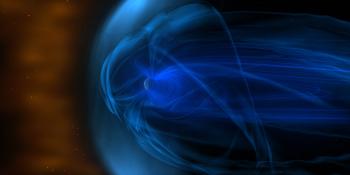Viewing archive of Sunday, 8 May 2005
Solar activity report
Any mentioned solar flare in this report has a scaling factor applied by the Space Weather Prediction Center (SWPC). Because of the SWPC scaling factor, solar flares are reported as 42% smaller than for the science quality data. The scaling factor has been removed from our archived solar flare data to reflect the true physical units.
Report of Solar-Geophysical Activity 2005 May 09 0120 UTC# Prepared jointly by the U.S. Dept. of Commerce, NOAA, #Space Environment Center and the U.S. Air Force. #
Joint USAF/NOAA Report of Solar and Geophysical Activity
SDF Number 128 Issued at 2200Z on 08 May 2005IA. Analysis of Solar Active Regions and Activity from 07-2100Z to 08-2100Z Solar activity was low. There was one C-class event at
0928 UTC from newly numbered Region 759 (N12E71). The group so far
appears to be a moderately large D-type sunspot group. A CME was
observed moving off the west limb at 1630 UTC but appears to be from
the backside of the disk.
IB. Solar Activity Forecast
Solar activity is expected to be low.
There is a slight chance for an isolated M-class event during the
next three days.
IIA. Geophysical Activity Summary 07-2100Z to 08-2100Z
The geomagnetic field ranged from active to major storm levels during
the past 24 hours with a severe storm period at high latitudes from
1200-1500 UTC. Magnetopause crossings were seen at GOES-12 at about
1330 UTC and 1610 UTC. Solar wind speed increased during the past 24
hours with peak values just below 900 km/s from 0900-1300 UTC.
Intervals of strongly negative Bz were seen around 07/2100-08/0100
UTC and again from 0900-1300 UTC. The solar wind signatures appear
to indicate the onset of a coronal hole high speed stream which has
been modified by transient flow from the CME of 06/1728 UTC. The
greater than 10 MeV protons gradually decayed from enhanced levels
to nearly background level by forecast issue time.
IIB. Geophysical Activity Forecast
The geomagnetic field is
expected to be at active to minor storm levels for the next two days
(09-10 May) as the current disturbance persists. Conditions are
expected to subside to mostly unsettled levels by the third day (11
May).
III. Event Probabilities 09 May to 11 May
| Class M | 20% | 20% | 20% |
| Class X | 01% | 01% | 01% |
| Proton | 01% | 01% | 01% |
| PCAF | green | ||
IV. Penticton 10.7 cm Flux
Observed 08 May 101 Predicted 09 May-11 May 100/100/100 90 Day Mean 08 May 093
V. Geomagnetic A Indices
Observed Afr/Ap 07 May 010/010 Estimated Afr/Ap 08 May 040/070 Predicted Afr/Ap 09 May-11 May 025/030-020/030-010/015
VI. Geomagnetic Activity Probabilities 09 May to 11 May
| A. Middle Latitudes | |||
|---|---|---|---|
| Active | 20% | 30% | 25% |
| Minor storm | 35% | 25% | 15% |
| Major-severe storm | 30% | 20% | 10% |
| B. High Latitudes | |||
|---|---|---|---|
| Active | 15% | 25% | 35% |
| Minor storm | 35% | 35% | 20% |
| Major-severe storm | 40% | 30% | 15% |
All times in UTC
Latest news
Latest forum messages
Incoming & Unnumbered Active Regions 1815Filaments and prominences 124Growth of Cycle 25 836CME 25AR4073 7
More topicsSupport SpaceWeatherLive.com!
A lot of people come to SpaceWeatherLive to follow the Sun's activity or if there is aurora to be seen, but with more traffic comes higher server costs. Consider a donation if you enjoy SpaceWeatherLive so we can keep the website online!

Space weather facts
| Last X-flare | 2025/03/28 | X1.1 |
| Last M-flare | 2025/04/22 | M1.3 |
| Last geomagnetic storm | 2025/04/21 | Kp5+ (G1) |
| Spotless days | |
|---|---|
| Last spotless day | 2022/06/08 |
| Monthly mean Sunspot Number | |
|---|---|
| March 2025 | 134.2 -20.4 |
| April 2025 | 126.5 -7.7 |
| Last 30 days | 124.6 -4.5 |


